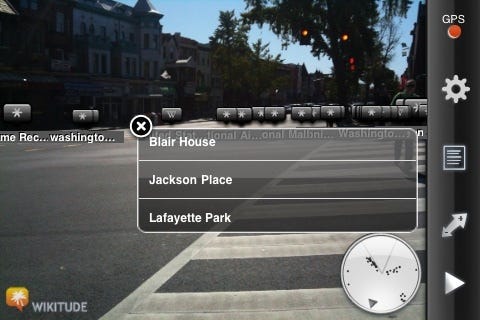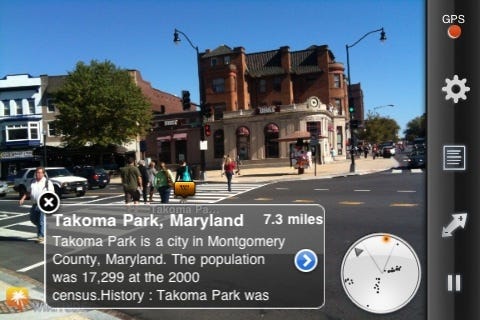Change Your Wikitude

Because I work in social media, every so often I'll get the question: So, what's the big new thing? For a couple of years now the answer has been "Twitter," but the micro-blogging service finally "arrived" in early 2009, so I've needed a new answer. Lately, I've settled on "augmented reality." As Wikipedia describes it:
Augmented reality (AR) is a term for a live direct or indirect view of a physical real-world environment whose elements are merged with-, or augmented by virtual computer-generated imagery - creating a mixed reality.
I.e. Terminator-vision, more or less. Now that the iPhone, Android-enabled devices and many more smartphones on the way have cameras and GPS (and compass in the iPhone 3GS) it becomes possible to determine where someone is, what they are looking at and serve up information to them on the spot. And it's a no-brainer to imagine that one of the first information resources likely to be used is Wikipedia—especially considering how many articles about real-world objects contain geographic coordinates for their subjects (for this you can thank the people at WikiProject Geographical coordinates).
Just this week a program called Wikitude, available to Android users for several months, hit the iTunes store. Wikitude actually pulls information from elsewhere too, but like the name implies, Wikipedia is a key resource. Ben Parr at Mashable explains:
The app, which only works on the iPhone 3GS model (since it has a compass), utilizes three layers of information and superimposes them on your iPhone: information from Wikipedia, local reviews from London-based Qype, and finally crowdsourced information from its Wikitude.me website. With it, you can tag any location with personal notes that others can see. You can’t tell me that isn’t awesome.
He is right. I can't. And Marshall Kirkpatrick at ReadWriteWeb writes:
It's because Wikitude is so open to user generated content that I find it the most exciting of all the Augmented Reality apps. Unfortunately, none of these apps that I've tested on Android are performing fabulously yet - the GPS is just too imprecise and the data too sparse. These are early days though, and even today it's a lot of fun to look at the world around you through Wiki articles.
As he indicates, Wikitude is not the only player in the game. Another one available for iPhone is Cyclopedia, which I didn't focus on just because I didn't want to pay for it (but here is Gizmodo's review). Wikitude, on the other hand, is available for the low, low price of free. (And as Tom Peterson would say, "free is a very good price.") I took it for a quick test run at the corner of 18th and Columbia in Washington, DC. Here's what I saw looking south along 18th Street:

And looking west in the direction of Columbia Heights:

Not displayed here is the ability to adjust the distance it will scan, a list-view of POIs (Points of Interest) and settings, which include the ability to turn on and off the different sources of information as well as different types of information. If you just want information from Wikipedia, it's just a few taps away. If you want information about shopping and sights but not traffic or towns, you can adjust this as well.
I'm not likely to use this a great deal here in Washington, DC where I'd at least like to think I know what everything is. But when I'm traveling, such as when I visit San Francisco for the first time later this month, I can see myself not only making use of the program but using it enough to move it temporarily onto my first page of apps.
Have you used Wikitude or a similar application? Anything you like or dislike about them? Please share in the comments.


